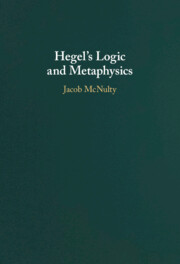‘Hegel's Logic might be the most obscure major work in the history of Western philosophy. Jacob McNulty's Hegel's Logic and Metaphysics marks a great advance in dispelling the obscurity. McNulty focuses on a deceptively simple question – how does Hegel justify the laws and materials of logic?–and in the course of answering it he offers a clear, well-argued, and original interpretation of the nature of Hegelian metaphysics.'
Mark Vinzenz Alznauer - Northwestern University
‘An important and first-rate contribution—bold, original, well argued, and rich with historical and systematic implications. By drawing attention to the ‘logocentric predicament,’ McNulty clarifies Hegel’s defense of metaphysics against worries like Kant’s.’
James Kreines - Claremont McKenna University
‘Jacob McNulty’s impressive book offers a Hegelian solution to the so-called ‘logocentric predicament’, namely that logic must be presupposed to justify itself. As McNulty puts it, the fundamental laws and materials (concepts, judgments, and inferences )of logic are either left unjustified or justified circularly (11-12). McNulty’s (Hegelian) solution is to derive logic from general metaphysics (23), or specifically Hegel’s ontology of categories (ix). Anyone with a serious interest in the relationship between Hegel’s dialectic logic and contemporary formal logic will be amply rewarded by studying McNulty’s thought-provoking book.’
C. Yang
Source: History and Philosophy of Logic
‘McNulty’s book is an excellent study of Hegel’s Logic. It is original, illuminating and thought-provoking throughout. Readers familiar with Hegel will learn much from it, and so - thanks to McNulty’s accessible and engaging style - will those unfamiliar with Hegel. I recommend the book heartily to both sets of readers.’
Stephen Houlgate
Source: Mind
‘In this regard, we can salute the audacity and originality of a work which aims to be more ‘philosophical’ than strictly historical, but whose strength nevertheless remains in not ignoring a close reading of the text and a detailed assessment of the debates surrounding it.’
Valentin Wey
Source: Archives de philosophie



